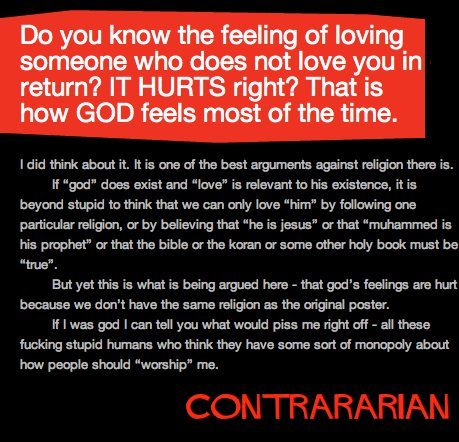 Time and again when talking to religious believers, I come across the spectacle of them asserting how their own spiritual experience validates their religion and beliefs, while rejecting the reported spiritual experiences of those of other faiths as being mistaken, delusional, demonic or even just wrong.
Time and again when talking to religious believers, I come across the spectacle of them asserting how their own spiritual experience validates their religion and beliefs, while rejecting the reported spiritual experiences of those of other faiths as being mistaken, delusional, demonic or even just wrong.
The Christian Apologist William Lane Craig explains on his website:
"Of course, anyone (or, at least any sort of theist) can claim to have a self-authenticating witness of God to the truth of his religion. But the reason you argue with them is because they really don't: either they've just had some emotional experience or else they've misinterpreted their religious experience."
"So you present arguments and evidence in favor of Christian theism and objections against their worldview in the hope that their false confidence will crack under the weight of the argument and they will come to know the truth. (This also is what the atheist should do with me.)"In practice, however, Craig makes it clear that no evidence could shake his self-authenticating "witness":
"...if Jesus' bones were actually found, then the doctrine of his resurrection would be false and so Christianity would not be true and there would be no witness of the Holy Spirit. So if Jesus' bones were found, no one should be a Christian. Fortunately, there is a witness of the Holy Spirit, and so it follows logically that Jesus' bones will not be found."Craig's problem is that by assuming his religious beliefs to be true a priori, he leaves no room for him to examine or challenge his own assumptions to any rigorous standard. Every challenge to his beliefs is met by apologies and rationalization, without any real consideration that he might just be wrong. In short, the burden of proof Craig demands of challenges to his beliefs are much higher - and arguably impossible to achieve - than those he asks or offers in support of his own preconceptions.
This means Craig never examines his own beliefs with the rigour that he challenges the beliefs of others. It is fair to say that Craig is simply dishonest in his handling of evidence for and against Christianity.
Further, Craig's defence of his beliefs leads him to support ludicrous conclusions, such as this:
"God ensures that no one who would believe the gospel if he heard it remains ultimately unreached. Once the gospel reaches a people, God providentially places there persons who He knew would respond to it if they heard it. He ensures that those who never hear it are only those who would not accept it if they did hear it. Hence, no one is lost because of a lack of information or due to historical and geographical accident. Anyone who wants or even would want to be saved will be saved."Craig argues here that given a free and fair choice, most people created by God would rather be punished eternally in hell with no possibility of reprieve than spend eternity in heaven. He says God placed non-Christians specifically in locations and situations where they were less likely to hear the "Gospel". He says that no matter how sincere a non-Christians religious belief or life is, they deserve nothing less than to burn eternally in hell.
As John Hick, Theologian and Philosopher of Religion, puts it:
"this is manifestly an a priori dogma, condemning hundreds of millions of people without any knowledge of them; and even many other very conservative Christian philosophers have found it repugnant. For on any reasonable view exclusivism, practiced within any religion, is incompatible with the existence of a God whose grace and mercy extends to the entire human race."In Craig's favour, however, his position does at least allow for the possibility of reasoned argument.
Steve Hays of Triablogue bases his belief on what he calls "divine revelation":
"At the level of basic epistemology, science can never disprove the Bible because divine revelation is our only clear window onto the world. Otherwise, we perceive the world through the stained-glass solipsism of our inescapable subjectivity."Here Hays denies even the possibility of rationality or reason as the basis for anything. That his beliefs are inescapably subjective will be obvious to everyone else - but it seems this will forever be a mystery to poor Steve.















